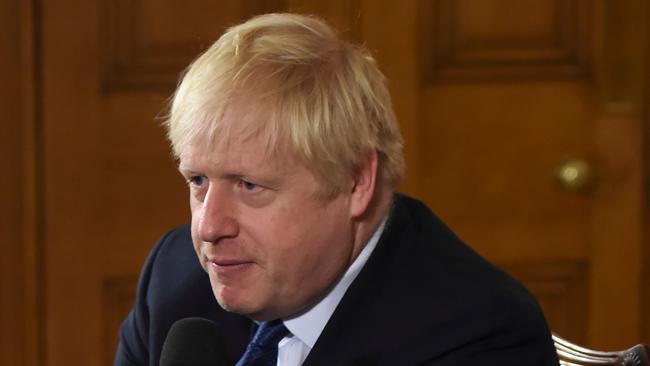Boris Johnson on how he will reach a deal with the EU
Boris Johnson says there is a way forward to reach a deal with the EU — if there are no ‘parliamentary shenanigans’.

I can’t remember the last time Boris Johnson was lost for words in one of our interviews — but the pause is palpable. On the mantelpiece against the far wall in the prime minister’s study, a neon clock dramatising the countdown towards Brexit on October 31 clunks through the seconds. One second of silence becomes two.
I’ve just asked him if being prime minister is more fun than being mayor of London. The man who has yearned for this office for a decade appears torn inside. We’ve just spent 20 minutes discussing the constitutional crisis engulfing his government. Would it be seemly to say he’s enjoying this? He blinks, decision made: “Um, honestly? Yes.”
That took a long time, I say. “But I wasn’t expecting it [to be more fun],” he explains. “I would be totally misleading you if I said I wasn’t. I hugely enjoy the job, of course I do. It’s a massive privilege to be asked to do this.
“I work non-stop. Unless I specifically tell you otherwise, I’m working. I burn the candle at both ends.”
He seems to sit up straighter in his chair, his tie a notch too tight at his neck, like a usually scruffy schoolboy hoping to impress the new teacher with his seriousness. How much sleep is he getting? “I don’t need much sleep, actually.”
That may be just as well this week as Johnson contemplates the challenge ahead. He is determined to leave the EU in two months’ time. Opposition MPs and a decent number of Tory rebels are equally determined to stop him.
Last week he announced that he had asked the Queen of England to prorogue, or suspend, parliament for five weeks up to October 14. This was greeted as either a “constitutional outrage” or a cunning tactic to limit the options of his enemies — depending on your Brexit proclivities.
Either way, it sets up a titanic battle in Britain’s House of Commons this week where MPs will seek to seize control of the agenda and pass a law forcing him to seek an extension to article 50 to prevent a no-deal Brexit.
Johnson makes clear he has no truck with the plan and will fight to resist it.
“What would it achieve? We had an extension in March, we had an extension in April, we’re now coming up to the end of August. What on earth are we achieving by this?”
Asked if he will ignore it, he ducks the question and says instead: “I simply say to my friends in parliament, I do not detect an appreciable reduction in people’s anxiety about this issue as a result of the extensions that have been. What we need to do is get a deal done, or if we can’t get a deal done then get out of the EU on October the 31st, come what may. And that’s what we’re going to do.”
Johnson’s move to prorogue parliament was denounced as a “constitutional outrage” by the Commons Speaker, John Bercow. Johnson rejects this, arguing that the time MPs are absent will be only four days longer than the recess already planned for the party conferences.
“I don’t wish to enter into the, some of the, polemics that I’ve seen around this, but I think some of the language, some of the characterisations of this have been quite bizarre.” This from the man who accused Theresa May of strapping a “suicide vest” around the British constitution and handing the detonator to Michel Barnier, the EU Brexit negotiator. The highest office seems to have mellowed him.
“Parliament has had three whole years for delectable disputations on this matter without successfully resolving it. You know, they will have bags of time both [this] month and the month after for further reflection and consideration.”
Johnson knows that confrontation is coming and he is using the “bully pulpit” of power to frame the choice, for both MPs and voters.
If he has his way, the government will use Wednesday to outline its spending plans, funnelling cash to the “people’s priorities” — impoverished public services and parts of the country that have been overlooked. The latter are likely to be leave-supporting areas where Johnson hopes to mine votes in a future general election.
There will be pounds 3.5bn for town hall budgets, pounds 1bn of which will go into social care. He talks of “levelling up opportunity”.
“This is the biggest, most generous spending review since the height of Tony Blair, since the height of New Labour, and it is a bonanza for local services,” he said.
“We’re putting a huge amount into social care, into schools, into transport and education. It is a huge locomotive freighted with investment, bashing through all the priorities I outlined on the steps of Downing Street.
“We have to go at this very fast because I think people have felt things have been a bit becalmed for the last few years. What we’re trying to do is put a bit of a tiger in the tank, put our pedal to the metal, foot to the floor.
“I was going to say full throttle except that would be to use a metaphor from the era of hydrocarbon-fuelled transport which we’re now leaving behind.”
He wants to make green issues a priority and repeats a pledge made by David Cameron: “I want this country, I want this administration, to be the greenest ever. We’re going to do extraordinary things on the environment.”
If all this splashing of cash sounds rather un-Conservative, Johnson is at pains to say that he is driven by “outputs not inputs”. He says: “I’m a Conservative, I don’t believe in judging success by the amount you spend. I’m not just interested in putting money into 20,000 more police officers, I want to see crime coming down.”
This is all just an election bung, isn’t it? “No,” he cries.
Yet he knows one is probably coming. Would he rule out calling one himself? ("I think the people of this country have had a bellyful of elections.") Would he be prepared to thwart the remainers by asking the Queen not to give royal assent to their bill ("I want us to get on and do a deal").
Would he take away the whip or deselect Tory MPs who back the rebel bill or vote against his government? ("I want everybody to come together as a party and deliver.")
On each and every stick that he might wield to get his way, Johnson remains vague, refusing to rule out any option.
This weekend he and his aides will discuss whether to turn the big votes this week into confidence issues, which could mean kicking former ministers out of the party if they defy him. What is certain is that he will ask them to pick a side.
“I just say to everybody in the country, including everyone in parliament, the fundamental choice is this. Are you going to side with Jeremy Corbyn and those who want to cancel the referendum; are you going to side with those who want to scrub the democratic verdict of the people and plunge this country into chaos? Or are you going to side with those of us who want to get on, deliver on the mandate of the people and focus with absolute, laser-like precision on the domestic agenda. That’s the choice.
“Jeremy Corbyn has made a historic decision to turn his party into the anti-democratic, referendum-cancelling party. That’s his decision. I think it’s totally wrong.”
His argument is that the anti-no-deal brigade are undermining his chances of getting concessions from the EU: “The one thing that could undermine the UK’s ability to negotiate would be Brussels thinking there’s some chance that the referendum could be cancelled and that Brexit could be blocked.
“That’s the way to make a deal impossible. The people who claim to be campaigning against no deal are making no deal more likely. That’s the problem.”
Johnson insists his shuttle diplomacy to Berlin and Paris and his time with EU leaders at last weekend’s G7 summit resulted in “some very interesting signs of progress in our conversations”, but EU officials say they are still waiting for a concrete proposal to negate the need for the Northern Ireland backstop.
Nonetheless it feels as if he is making more headway with Brussels than with the Tory rebels. He laughs: “I think many British prime ministers have had that sensation in the past.”
In a cabinet conference call last week Johnson told his fellow ministers that he wanted to remove “the critical paragraphs” that bind Britain into the Northern Ireland backstop. “There’s a good chance we’ll get a deal and there’s a good chance that we won’t,” he admitted.
Yet he failed to spell out even to his cabinet colleagues how he plans to get a deal. This secrecy will unnerve some of his allies in the European Research Group of Brexiteer hardliners, who had been told by him that May’s deal was “dead”. It will also unnerve those who heard him declare that no deal was a “million-to-one shot” only to see him correct that to “50-50” last week.
I ask why people should trust what he says now. He dead bats that, just as he ducks questions about his partner Carrie Symonds, his wife Marina Wheeler’s cancer and whether his children went to state or independent schools, the first prime minister who has not answered that question: “I don’t generally talk about my kids.”
Has he told the Queen his plan? He won’t say: “I think even that would be to infringe the code of the privy council. I can’t do that.”
Britain needs to “come out of the incarceration of the backstop” and the Europeans accepted better Britain’s objections to it. “Everybody understands what is wrong with the current withdrawal agreement: it keeps the UK locked into the EU. It means they can boss us around on trade policy or on how we legislate for ever,” he said.
“That’s plainly unacceptable. But that point has landed with our friends and I think everybody’s now thinking about a way forward.”
He claims that the greater clarity he has given the EU about the future relationship has also helped to build bridges: “I think they recognise there’s a UK government that has a great deal of clarity about what it wants and a very clear vision of UK-EU relations in the future which wasn’t perhaps the case beforehand. I think they appreciate that.
“We hope for progress. But at the back of their minds there’s always this lingering suspicion, hope/anxiety, that there could be some parliamentary shenanigans or parliamentary process that somehow stymies Brexit.”
Johnson as prime minister is the same but different: bold to the point of recklessness in his tactics; more cautious in explaining them. All politicians grow in office but an eruption of his Dulux dog hair is making a reappearance, along with a few extra pounds. His flirtation with veganism is receding in the rear-view mirror. “I need to go running again,” he says cheerfully.
“The trouble is: to go running, ‘prot’ force’ [protection officers] have to come in from miles around to run with you in a slightly Putin-esque way. But I’m in good shape. I’m as fit as a butcher’s dog.”
He’ll need to be.
The Sunday Times



To join the conversation, please log in. Don't have an account? Register
Join the conversation, you are commenting as Logout